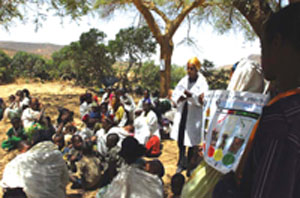1.6.3 Organising and planning
Unplanned health education sessions may well be a waste of effort. Planning and organisation are fundamental for Health Extension Practitioners in order to conduct effective health education and distinguish it from other incidental learning experiences.
The Health Extension Practitioner should decide in advance the what, why, how, who and when of each health education session. It is very important to make the health education planning participatory and include other people and groups if possible. Health education, starting from planning, through the implementation, monitoring and evaluation stages should always consider the active and full participation of the concerned audience.
Why do you think that it is a good idea to include representatives of your target audience when you are planning your health education activities?
The importance of including members of your audience when you plan health education activities is to get support and be successful in your health education sessions. If people feel they are involved then they are more likely to think the activities apply to them and to feel committed to them.
It is unthinkable to provide health education without scientific knowledge related to the topic or issues to be addressed. For example, the health educator must know the current scientific knowledge on how HIV/AIDS is transmitted and details of various prevention methods. This will be covered in the Communicable Diseases Module. Scientific knowledge is changing with time and your educational sessions will have to keep up with the latest developments (Figure 1.6).
Fatuma is a Health Extension Practitioner. While conducting a health education session on breastfeeding she said to her audience ‘I think HIV/AIDS might be transmitted from mother to child through breastfeeding’. What did you observe from the above scenario? How would you expect Fatuma to respond?
The Health Extension Practitioner should know that HIV/AIDS is transmitted from mother to child through breastfeeding, but that there are ways that the risk of this can be reduced. Health education activities should not be planned haphazardly but organised based on scientific findings and correct knowledge. You should not provide health education without scientific knowledge.

Now try this out for yourself.
Imagine that you are conducting a health education session in your local community. During your teaching you say ‘I think female genital mutilation (FGM) is harmful’ or ‘I think tobacco causes cancer’. What would be a better way of putting this?
Because your health education needs to be based on scientifically valid facts this is incorrect. You should be more confident and assertive. It is correct to say ‘female genital mutilation (FGM) is harmful’ or ‘tobacco causes cancer’. When you know something to be the case always express it as a fact.
1.6.2 Using multiple methods and materials in health education
